mobile Ansicht, to the English Version tap the flag


- im 8. Jhd. Herzogtum Kantabrien
- heute Autonome Region Spaniens
• Flagge
• historische und andere Flaggen
• Bedeutung/Ursprung der Flagge
• Wappen
• Bedeutung/Ursprung des Wappens
• Landkarte der autonomen Regionen Spaniens
• Landkarte der historischen Königreiche auf der Iberischen Halbinsel
• Zahlen und Fakten
• Geschichte
• Ursprung des Landesnamens
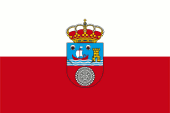
Flagge von Kantabrien,
Seitenverhältnis = 13:25,
Quelle, nach: Flags of the World






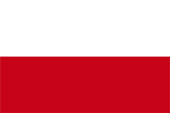
1845, 1982–1984,
Flagge von Kantabrien,
Quelle, nach: World Statesmen



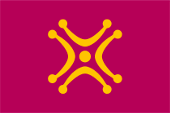
Lábaru,
inoffizielle Nationalflagge der Kantabrer,
Seitenverhältnis = 2:3,
Quelle, nach: Oren neu dag, CC BY-SA 3.0, via Wikimedia Commons




seit 1976,
Flagge der ADIC,
Seitenverhältnis = 2:3,
Quelle, nach: Greti85, CC BY-SA 4.0, via Wikimedia Commons




Die heutige Flagge Kantabriens wurde am 30.12.1981 eingeführt. Sie zeigt zwei horizontale Streifen in Weiß und Rot und seit dem 22.12.1984 in der Mitte das Wappen Kantabriens. Das Wappen ist aus optischen Gründen leicht nach oben verschoben. Die Flagge wird häufig ohne Wappen dargestellt. Die Gestaltung der Flagge geht auf einen Entwurf von 1845 zurück. Eine weitere Flagge von großer regionaler Bedeutung ist das erst vor einigen Jahren populär gewordene "Lábaro Cántabro", das Kantabrische Labarum. Es geht auf das Aussehen der Fahnen der römischen Legionen zurück und greift die Verehrung auf, die die römischen Truppen ihren Feldzeichen entgegenbrachten. Das Motiv ist Symbolik, die von den kantabrischen Stelen aus vorrömischer Zeit inspiriert ist: vier Halbmonde, die sich zu zwei gegenüberstehen. Eine andere regionale Flagge ist die Flagge der ADIG (Asociación para la Defensa de los Intereses de Cantabria – Verein zur Verteidigung der Interessen Kantabriens), eine Flagge mit drei senkrechten Streifen in Grün, Grau und Hellblau. In den meisten autonomen Regionen Spaniens begann die neuere Flaggengeschichte bereits in den Jahren vor der Vergabe des Autonomiestatuts mit einer Flagge ohne Wappen, weil die Wappen oftmals noch gar nicht beschlossen waren. Immerhin hat sich meist durchgesetzt, dass die Flagge mit dem Wappen von den regionalen Behörden oder zu offiziellen Anlässen verwendet wird und die Flagge ohne Wappen quasi zu privaten, dekorativen Zwecken verwendet werden soll.
Quelle: Wikipedia (ES),
Wikipedia (EN),
Volker Preuß


seit 1984,
Wappen von Kantabrien,
Quelle, nach: Wikipedia (ES)

Das heutige Wappen Kantabriens wurde am 22.12.1984 eingeführt. Der Wappenschild ist geteilt und zeigt in seiner oberen Hälfte eine Szenerie aus dem Jahre 1248 als Kaufleute aus Kantabrien mit einem Schiff die Kettensperre des Hafens der maurischen Stadt Sevilla durchbrachen und somit großen Anteil bei der Befreiung der Stadt hatten. Die untere Hälfte des Schildes ist rot und zeigt eine silberne Scheibe mit geometrischen Mustern, eine Sonnendarstellung entnommen von den kantabrischen Stelen aus vorrömischer Zeit. Oberhalb des Wappenschildes erscheint eine Königskrone.
Quelle: Wikipedia (ES),
Volker Preuß

Die autonomen Regionen Spaniens:
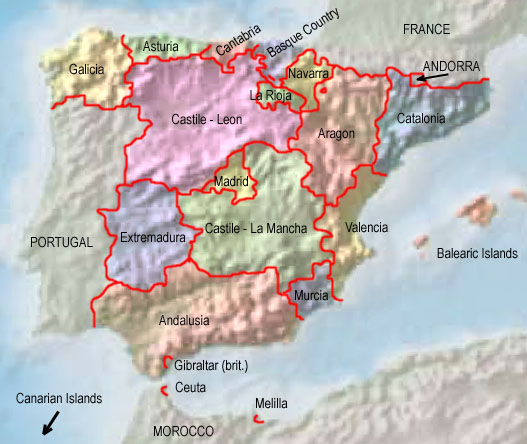
Quelle/Source: Freeware, University of Texas Libraries, modyfied by: Volker Preuß

Karte der historischen Königreiche auf der Iberischen Halbinsel (ca. 1220):
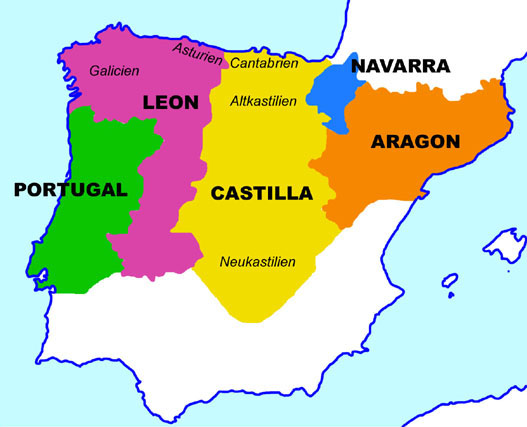
Landkarte/Map: Volker Preuß

Fläche: 5.321 km²
Einwohner: 585.402 (2022), meist Kanatbrische Kastilier (Spanier)
Bevölkerungsdichte: 110 Ew./km²
Hauptstadt: Santander, 171.693 Ew. (2022)
Amtssprache: Spanisch (Kastilisch)
Währung: spanische (Euro-)Währung
Zeitzone: MEZ
Quelle: Wikipedia (EN)

Frühzeit · Besiedlung des heutigen Kanatbriens durch das indogermanische Volk der Kantabrer (lateinisch: Cantabri)
Antike · Einwanderung der Iberer
ca. 600 v.Chr. · Einwanderung von Kelten, die Kantabrer werden durch Vermischung zu Keltiberern
218–201 v.Chr. · Zweiter Punischer Krieg, das Römische Reich erwirbt die Besitzungen Karthagos in Iberien, Unterwerfung der ganzen Iberischen Halbinsel bis zum Jahre 19 v.Chr., in Kantabrien teilweise römische Besiedlung, teilweise Romanisierung
ca. 400 n.Chr. · Völkerwanderung, Durchzug germanischer Alanen, Sweben und Westgoten, das heutige Kantabrien wird Teil des Westgotenreiches
711–714 · Vernichtung des Westgotenreichs durch von Nordafrika kommende Araber, die Westgoten ziehen sich nach Asturien und Kantabrien zurück wo sie sich mit den keltiberischen Kantabrern mischen, Bildung des westgotischen Herzogtums Kantabrien unter Herzog Peter, Errichtung der Hauptstadt Amaya, es gelingt den Arabern nicht Kantabrien zu erobern
739 · Wahl von Alfons I., Sohn von Herzog Peter von Kantabrien, zum Fürsten (König) von Asturien, Vereinigung von Asturien und Kantabrien
ca. 800 · Alfons II. (König von Asturien) verteidigt Kantabrien in der Schlacht von Los Barrios de Luna gegen die Araber und schlägt sie vernichtend
weitere Geschichtsdaten siehe Asturien
14.–15. Jahrhundert · die Häfen Kantabriens erlangen große Bedeutung für den Handel mit Wolle aus Kastilien
18.–19. Jahrhundert · die Häfen Kantabriens erlangen große Bedeutung für den Handel Spaniens mit seinen Kolonien in Amerika
1808–1813 · Kantabrien ist durch französische Truppen besetzt, Guerillakrieg gegen die Besatzer
1833 · die bis dato in Spanien bestehenden Teilkönigreiche und Regionen werden in Provinzen aufgeteilt, das Königreich Asturien in die Provinzen Oviedo und Santander (Kantabrien)
1936–1939 · Spanischer Bürgerkrieg, Kantabrien kämpft kurzzeitig (bis 1937) auf der Seite der sozialistischen Zentralregierung
11.01.1982 · Kantabrien erhält das Autonomiestatut innerhalb Spaniens (ehemalige Provinz Santander), Gründung der "Autonomen Gemeinschaft Kantabrien"
Quelle: Wikipedia (ES),
World Statesmen,
Volker Preuß

Der Name "Kantabrien" geht den indoeuropäischen Stamm der Kantabrer zurück, der hier in der Frühzeit und Antike siedelte. Der Name dieses Volkes schein baskischen Ursprungs zu sein, vielleicht hat es auch Baskisch gesprochen, die älteste Sprache Europas, denn das baskische Wort "kant" bedeutet "bei" und der Fluss Ebro heißt auf Baskisch "abre". Die Kantabrer waren die "beim Ebro" wohnenden.
Quelle: Handbuch der geographischen Namen


![]()














